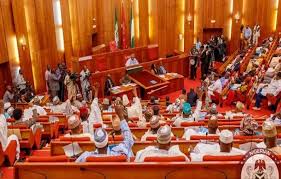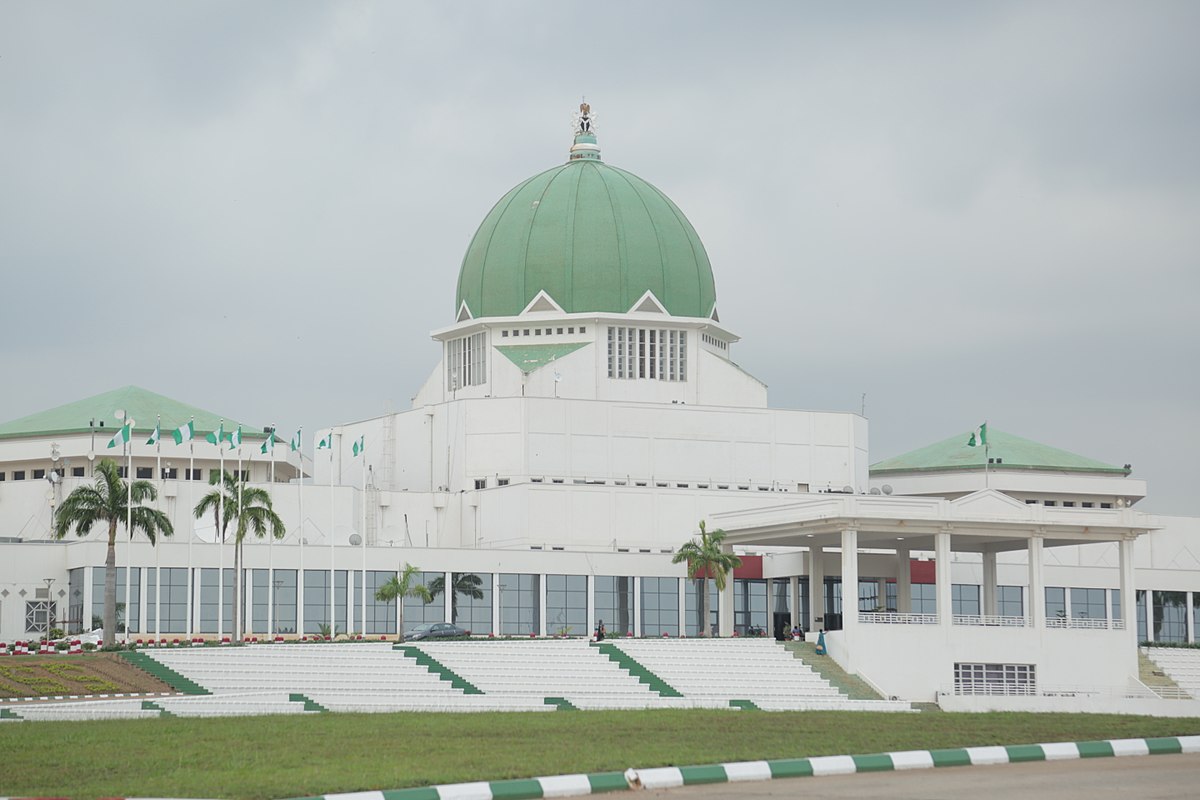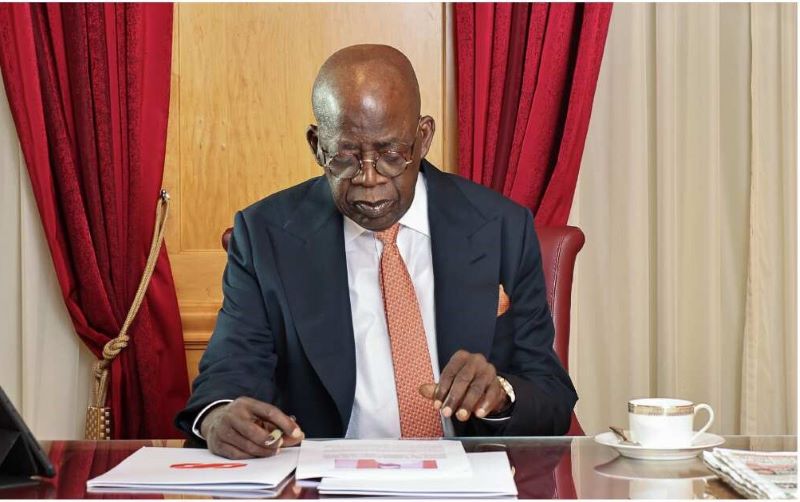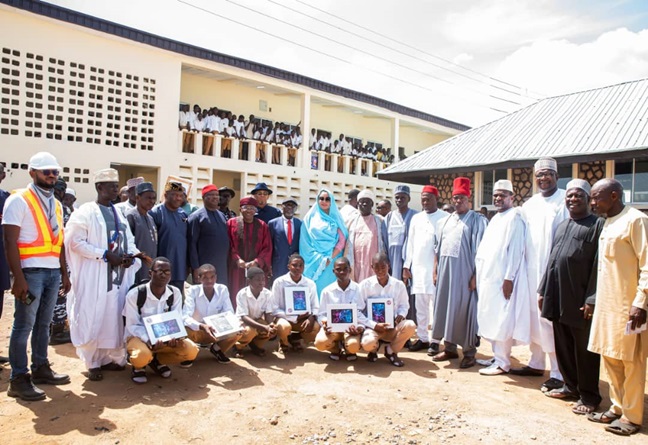Legislature
Senate passes N17.126trn budget for 2022

****adjourns plenary till January 18, 2022
The Senate has passed a N17.126trn budget for the 2022 fiscal year, raising the figure by N800 billion.
The passage of the budget was sequel to the consideration of a report by the Committee on Appropriations on the 2022 Appropriations bill.
The House of Representatives phad passed the budget on Tuesday.
President Muhammadu Buhari had submitted a budget of N16.391 trillion to the National Assembly.
The Senate also raised the oil benchmark to $62 as against the $52 that was proposed by the executive, while the exchange rate was retained at N410.15.
It said the increase in oil price was to reflect the current market values of the oil barrel in the international market.
In his presentation, Chairman of the Committee, Jibrin Barau (APC – Kano North), while giving highlights of the bill, said out of the total sum of N17.126trn for the fiscal year 2022, N869.6bn is for Statutory transfers; N3.8trn is for Debt Service; N6.9trn is for Recurrent Expenditure; and N5.4trn for Capital Expenditure.
Barau recalled that the National Assembly had approved 1.88mbpd Daily Oil Production and US$62 as against $US57 proposed by the executive arm of government.
He explained that the increase in oil price Benchmark from US$57 to US$62 was done to reflect the current market value in the international market.
He added that the exchange rate was pegged at N410.15/US$1, Gross Domestic Product (GDP) Rate at 4.2 and Inflation Rate at 13 percent.
The lawmaker explained that out of the N17,126,873,917,692 passed, N869,667,187,542 is for Statutory Transfer; N6,909,849,788,737 is for Recurrent Expenditure; N5,467,403,959,863 is for Capital Expenditure; and N3,879,952,981,550 is for Debt Service.
The Committee in its recommendations stated that additional revenues discovered should be provided to the Works and Housing Ministry for funding of critical projects, Independent National Electoral Commission (INEC), for the 2023 General Elections, Defence and the National Population Commission for the 2022 Population Census.
It added also that N98 billion naira increase in deficit should be approved to take care of some of the additional requests from the executive arm of government.
A breakdown of recurrent expenditure shows that N61,079,757,342 was budgeted for the Presidency in 2022, N996,09 1,292,618 for Defence, N79,243,483,198 for the Ministry of Foreign Affairs, N55,796,274,038 for Federal Ministry of Information and Culture, N257,626,461,524 for Ministry of Interior, N7,919,353,247 for Office of the Head of Civil Service of the Federation, and N4,476,854,068 for the Auditor General for the Federation.
While the Federal Ministry of Police Affairs received N518,532,292,470, the Ministry of a communications and Digital Economy got N23,387,996,618, National Security Adviser – N155,820,2 14,009, Infrastructure Concession Regulatory Commission – N1,344,674,257, Secretary to the Government of the Federation – N62,575,420,244, Federal Ministry of Special Duties and Inter-Governmental Affairs – N4,439,614,685, Federal Ministry of Agriculture and Rural Development – N75,544,228,649, and Federal Ministry of Finance, Budget and National Planning – N28,604, 104,969.
In addition, the Federal Ministry of Industry, Trade and Investment received N17,966,745,438, Federal Ministry of Labour and Employment – N14,453,726,978, Federal Ministry of Science, Technology and Innovation – N49,683,523,165, Federal Ministry of Transport – N15,892,132,819, Federal Ministry of Aviation – N7,692,548,460, Federal Ministry of Power – N6,262,156,943, and Ministry of Petroleum Resources – N30,502,257, 191.
Also, N12,038,392,758 was budgeted for the Ministry of Mines and Steel Development, N31,935,604,197 for Federal Ministry of Works and Housing, N870,534,226 for National Salaries, Incomes and Wages Commission, N456,245,928 for Fiscal Responsibility Commission, N10,669,058,320 for Federal Ministry of Water Resources, N26,761,780,448 for Federal Ministry of Justice, and N11,655,253,717 for the Independent Corrupt Practices and Related Offences Commission.
Others are Federal Capital Territory Administration – Nil, Federal Ministry of Niger Delta – N2,569,680,304, Federal Ministry of Youth and Sports Development – N185,489,102,966, Federal Ministry of Women Affairs – N2,103,758,084, Federal Ministry of Education – N593,473,925,256, Federal Ministry of Health – N462,858,698,619, Federal Ministry of Environment – N22,796,647,842, National Population Commission – N8,880,618,082, and Ministry of Humanitarian Affairs, Disaster Management and Social Development – N7,669,972,542.
Other Executive bodies such as the Federal Code of Conduct Bureau received N2,343,845,401, Code of Conduct Tribunal – N830,910,644, Federal Character Commission – N3,272,871,999, Federal Civil Service Commission – N1,217,473,478, Police Service Commission – N926,505,919, and Revenue Mobilization, Allocation, and Fiscal Commission – N2,337,230,632.
The Senate, after passing the 2022 budget, adjourned plenary till January 18, 2022 for the Christmas break.
Legislature
NASS modifies NDLEA Act, Prescribes Life Imprisonment for Drug Traffickers

The National Assembly has modified the National Drug Law Enforcement Agency (NDLEA) Act to prescribe life imprisonment for individuals found guilty of storing, transporting, or concealing illicit drugs and substances.
The amendment was adopted on Thursday during plenary, presided over by Deputy Senate President Barau Jibrin, following broad support from the senators.
The amendment reflects a harmonised position of the Senate and the House of Representatives on Section 11 of the NDLEA Act.
The House had earlier passed an amendment prescribing life imprisonment for drug traffickers, while the Senate had proposed the death penalty.
To reconcile the differences, a conference committee of both chambers was convened. Senator Tahir Monguno, Chairman of the Senate Committee on Judiciary, Human Rights, and Legal Matters, presented the harmonised version to the Senate.
He urged lawmakers to adopt the House’s position of life imprisonment, arguing that enforcing the death penalty could lead to the execution of over 900 accused persons currently awaiting trial for drug-related offenses.
The Deputy Senate President who presided over the plenary had put the resolution to a voice vote, and the majority of senators supported the amendment.
The approved version stipulates life imprisonment for offenders.
The amended section now reads:
“Anybody who is unlawfully involved in the storage, custody, movement, carriage, or concealment of dangerous drugs or controlled substances and who, while so involved, is armed with any offensive weapon or is disguised in any way, shall be guilty of an offence under this Act and liable on conviction to be sentenced to life imprisonment.”
This amendment aims to strengthen the fight against drug trafficking while addressing concerns over human rights and the judicial implications of the death penalty.
The move is part of efforts to curb the growing menace of drug trafficking and its adverse effects on Nigerian society. According to Senator Monguno, the life imprisonment penalty strikes a balance between deterrence and humane judicial practice.
With the amendment, the NDLEA now has a robust legal framework to prosecute offenders and combat drug-related crimes effectively.
Legislature
President Tinubu urges Senate to approve ₦1.767trn External Loan

President Bola Ahmed Tinubu has formally requested the National Assembly’s approval for a $2.209 billion (₦1.767 trillion) external borrowing plan to finance part of the ₦9.17 trillion fiscal deficit in the 2024 budget. The loan, included in the 2024 Appropriation Act, is critical to the government’s broader strategy for economic recovery and growth.
In a letter to Senate President Godswill Akpabio, President Tinubu noted that the borrowing aligns with the provisions of Sections 21(1) and 27(1) of the Debt Management Office (DMO) Establishment Act, 2003. He also indicated that the Federal Executive Council (FEC) had approved the plan.
The President explained that the funds would be sourced through Eurobonds or similar external financial instruments. A detailed summary of the loan’s terms and conditions accompanied the letter to guide legislative scrutiny.
“This borrowing is necessary to address the budget deficit and fulfill our fiscal strategy for 2024. Swift approval will enable us to move forward with mobilizing these funds,” the President stated, emphasizing the urgency of the request.
Senate President Akpabio referred the matter to the Committee on Local and Foreign Deb
Legislature
Senator Natasha Transforms Kogi Central Schools with 5,000 Digital Learning Devices

By Isah Bala
Access to quality education is a cornerstone of societal progress, and Senator Natasha Akpoti-Uduaghan is embodying this vision by bringing transformative educational tools to Kogi Central. In a groundbreaking initiative, the senator recently provided 5,000 digital learning devices to public primary and secondary schools in her district, aiming to bridge the digital divide and set a new educational standard.
The devices, unveiled at Abdul Aziz Attah Memorial College (AAAMCO), are preloaded with the Nigerian curriculum from UBEC and internationally acclaimed educational resources, including Khan Academy and Discovery Kids. Through this initiative, students will experience interactive learning, enabling them to explore subjects in depth, enhance digital literacy, and engage with complex topics in a hands-on way.
This project is just the beginning of Senator Natasha’s ambitious plan to make “smart schools” the norm in Kogi Central. She envisions a future where every child in her district has equal access to digital learning, stating, “My dream is to equip all public primary and secondary schools in Kogi Central with digital learning devices before the end of my tenure in 2027.”
Beyond device distribution, the senator’s initiative includes UBEC-led teacher training to ensure educators are equipped to integrate these tools into their classrooms effectively.
With this dual approach of student and teacher empowerment, Senator Natasha is laying a foundation that will support digital literacy and skill development for years to come.
Senator Natasha’s commitment to educational advancement represents a significant step forward for Kogi Central, ensuring that young students have access to the tools they need to succeed in an increasingly digital world. This initiative marks her dedication to the constituency that entrusted her with this mandate.
-

 Crime1 year ago
Crime1 year agoPolice nabs Killer of Varsity Lecturer in Niger
-

 News10 months ago
News10 months agoFCT-IRS tells socialite Aisha Achimugu not to forget to file her annual returns
-

 Appointment1 year ago
Appointment1 year agoTinubu names El-Rufai, Tope Fasua, others in New appointments
-

 News From Kogi1 year ago
News From Kogi1 year agoINEC cancells election in 67 polling units in Ogori-Magongo in Kogi
-

 News From Kogi1 year ago
News From Kogi1 year agoEchocho Challenges Tribunal Judgment ordering rerun in 94 polling units
-

 News1 year ago
News1 year agoIPOB: Simon Ekpa gives reason for seperatists clamour for Biafra
-

 Metro8 months ago
Metro8 months ago‘Listing Simon Ekpa among wanted persons by Nigeria military is rascality, intimidation’
-

 News10 months ago
News10 months agoKingmakers of Igu/ Koton-Karfe dare Bello, urge him to reverse deposition of Ohimege-Igu
